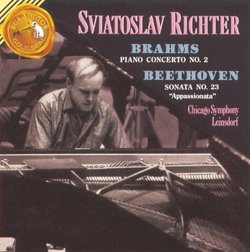| All Artists: Sviatoslav Richter, Erich Leinsdorf, Chicago Symphony Orchestra Title: Brahms: Concerto No.2/Beethoven: Sonata No.23 Members Wishing: 1 Total Copies: 0 Label: RCA Release Date: 1/12/1993 Genre: Classical Styles: Forms & Genres, Concertos, Sonatas, Historical Periods, Classical (c.1770-1830), Modern, 20th, & 21st Century, Romantic (c.1820-1910), Instruments, Keyboard, Symphonies Number of Discs: 1 SwapaCD Credits: 1 UPC: 078635651829 |
Search - Sviatoslav Richter, Erich Leinsdorf, Chicago Symphony Orchestra :: Brahms: Concerto No.2/Beethoven: Sonata No.23
 | Sviatoslav Richter, Erich Leinsdorf, Chicago Symphony Orchestra Brahms: Concerto No.2/Beethoven: Sonata No.23 Genre: Classical
Richter was one of the those great virtuoso egomaniac genius types who was so insecure that he practiced for something like 10 hours a day, even before a scheduled performance. But it wasn't just getting the notes right ... more » |
Larger Image |
CD DetailsSynopsis
Amazon.com essential recording Richter was one of the those great virtuoso egomaniac genius types who was so insecure that he practiced for something like 10 hours a day, even before a scheduled performance. But it wasn't just getting the notes right that he was after. He was looking for the way to somehow get an entire work "into his hands," and trying to figure out the relationships between all of its different parts. That's why his performances--even the very slow one--have such an inevitable sounding organic unity. This performance isn't one of the very slow ones, but it does have that sense of urgency and spontaneity, as though Richter and Leinsdorf were composing as they play. It's one of the great recordings. --David Hurwitz Similar CDs
|
CD ReviewsOne of the better Brahms concertos - and a nice dessert hjonkers | The Netherlands | 07/11/2004 (5 out of 5 stars) "In his notebooks, Richter himself tells repeatedly how strongly he disliked this performance of the Brahms Second. Most significantly, he blames Leinsdorf for pushing the tempo all the time. For the rest we have to guess for what his motives could be. After all, it is quite strange that the pianist in what is perhaps the best-loved of all Brahms B flat's doesn't like it himself. What could Richter have had in mind? Perhaps he had even greater ideas for this piece - but as it is here, I cannot possibly imagine. Richter gives probably the pianistically most perfect rendition of the concerto ever made, coupled with a musical insight that most of his colleagues could hardly dream of. And considering Leinsdorf: his accompaniment is very correct and I don't hear him pushing at any time - actually, Richter's playing is so dominant that it is the piano which seems to take the lead in the piece, not the orchestra. And that's fine with me. I like it better than the also much-revered Gilels/Jochum recording: Gilels takes his time and is philosophizing around, but in the end he almost drowns in his own ideas. Richter's playing on the other hand is full of richness too, but never makes the piece excessively ponderous and storms right at the gates with utmost certainty. Similarly, Richter possesses all the power of a Serkin but avoids the latter's sometimes ugly neuroticism and his patronizing focus on rhythms. He takes about as many risks as Schnabel, but is pianistically more reliable. This all is not to say that we have the perfect recording of the Brahms here: pianists like Schnabel, Fleisher, Fischer, Anda, Curzon, Solomon, Brendel et al. show many insights for which Richter has no space. In fact, I'd perhaps take Solomon and Edwin Fischer over Richter in the end, but that's really splitting hairs. There are many unforgettable moments here: the piano solo before the first orchestral tutti in the first movement blazes with fire and excitement - and complete technical mastery. I've never heard it played as good as here. And then the following piano entry after 3 minutes - Richter's fantastic, illuminating tone and sonorous basses shine through so well here. And then, in the following minutes, we get a demonstration of how to connect phrases almost effortlessly (perhaps this is what the editorial reviewer refers to, although he has come up with his usual nonsense as well). The marcato after 7 minutes once again demonstrates his technical skills, but also an incredible feeling for rhythm and excitement. The tender scenes are just that - and a look forward to the great slow movement. The second Allegro I'd say has the same fury as in Serkin's recording, but Richter is far more flexible and less dogmatic. Richter's approach to the Andante is rock-solid and unfussy; it is wonderful to hear how he is able to play without any mannerisms and yet generate the highest level of expression. In the Allegretto, Richter's sweet but powerful tone again does small wonders; he seems to shape many small and lively episodes within this movement that is sometimes treated as a perfunctory and dull conclusion. Not here; the Allegretto makes the ideal end for this hugely impressive recording. I haven't spilled a word yet about the Appassionata on this disc, and it should not be left unnoticed that this, too, is a masterful performance. The first movement is boldly shaped, with lots of contrasts in tempi dynamics. However, it perfectly adds up in the end and it betrays that SR had a strong sense of architecture as well. The slow movement is done solemnly and with beautiful tone-coloring. And there's the famous last movement that runs at incredible pace - and still Richter never loses control. Yet good as this one may be, it is completely outshined by a live performance by Richter in Prague from one year earlier - there he drops all his caution and you'll get more passion in the opening, more life in the slow movement and a final that is about the most exciting piano recording made, period. But enthusiastic as I am about even that live performance, the greatest Appassionata on record I believe is by Claudio Arrau (Philips), who is more faithful to the original text and responds best of all to the complex characteristics of this marvelous sonata. So, the recording included here is a nice dessert, but the main thing is definitely that wonderful Brahms which you just cannot afford to pass by. Certainly one of the finest documents of Richter's playing." An Old Favorite that Continues to Delight J Scott Morrison | Middlebury VT, USA | 05/21/2003 (5 out of 5 stars) "I had loved this recording from its appearance back in the 1960s. It was recorded during Richter's first tour of the US at a time when he wasn't very well known here. His tour changed that. I remember the buzz that ran through American music circles like an electric current at that time. I bought the recording then and immediately put it up there with my old Rubinstein and Schnabel recordings, and later the Gilels and Fleischer recordings. But when the change to CDs came (and I owned my first CD player in 1980, if you can imagine) I put it and my other LPs away and set about rebuilding my collection in the new format. Somehow I forgot about the Richter, never replacing it with a CD copy.Only recently have I become reacquainted with this performance of the Brahms Second Concerto and I've fallen in love with it all over again. It's hard to describe how Richter mesmerizes with his playing, but he does - not always, but often enough that it begins to seem almost like a supernatural talent he has. One thing you always know is that every note is considered in context; there is never anything routine about his playing. And I'm convinced that he had a monumental musical intellect to go with his fantastic technique.In this recording Leinsdorf is a very sensitive accompanist and the Chicago Symphony give him everything he asks for, especially Robert La Marchina, the superb cello soloist in the third movement; not long after this he left the CSO and became conductor of the Honolulu Symphony. Leinsdorf could be a maddening conductor, unduly fussy at times and at other times rather mechanical. I never quite figured him out, although occasionally his recordings soared. And this is one of those.I was not familiar with Richter's Appassionata until this CD. It is certainly brilliant, even titanic, but just a bit mannered for my taste. I still prefer the classic Rubinstein recording, although I also like Goode, Kuerti, Gilels and others. I would not hesitate to recommend this remastering. The sound if just fine. And that Brahms - oh my!Scott Morrison" A definitive Brahms' 2nd Concerto J Scott Morrison | 12/14/1999 (5 out of 5 stars) "This is one recording of the Brahms' 2nd Piano Concerto which is a an absolute "must have". It possesses internal unity of structure which is what gives Richter's performance in this case (as well as in case of just about anything he ever played) its unique emotional and intellectual qualities. Add to it an incredible sound color, warmth and virtuosity and you get a definitive recording. Just like a previous reviewer, I am writing this because of a remark made by your editorial writer about Richter being an "egomaniac" because he wished to achieve a perfect interpretation and to that end practiced 10 hours a day. I'm not sure that pop-psychology lingo belongs in a review of a sound recording. In truth, Ricter did not, as mentioned before, practice 10 hours a day. But what if he did? Since when is it wrong for a musician to practice a lot? Or to try hitting only the right notes? Or to strive to get a grasp of a musical composition in its entirety? Is it making a performer less of an human if his interpretation shows that he actually thought about a piece and wishes to communicate to a listener what is important to him in that piece? Richter was indeed a genius and a virtuoso, but by all accounts, he actually was a decent human being. As an artist, he was a modest and a self-effacing one rather then an egomaniacal mega-star. As a music critic, maybe Mr Hurwitz should stick to music and leave psycho-babble to day-time talk shows."
|

 Track Listings (7) - Disc #1
Track Listings (7) - Disc #1
